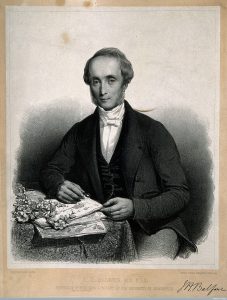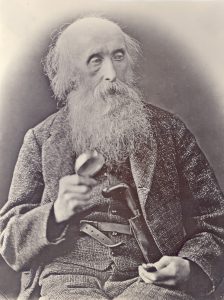John Hutton Balfour
Born: 15 September 1808
Place of Birth: Buccleuch Place, Edinburgh
Died: 11 February 1884
Place of Death: Inverleith House, Edinburgh
Occupation: Botanist and Teacher
The eldest son of Andrew Balfour, an army surgeon who became a printer and publisher in Edinburgh and Magdalene Goldie, daughter of Reverend George Goldie, John Hutton Balfour received his basic education under Carson and Pillans at the High School in Edinburgh. From the High School, Balfour studied in the Arts Faculty of the University of Edinburgh, graduating with an M.A. in 1824. Balfour spent the next year at the University of St. Andrews studying Moral Philosophy, Mathematics, and Natural Philosophy. On leaving St. Andrews Balfour returned to the University of Edinburgh to study Divinity, Hebrew, French and Italian. Rebelling against his parents’ desire that he enter the Church, in 1826 Balfour transferred to the Medical Faculty and was apprenticed to Sir George Ballingall, Professor of Military Surgery from 1827 to 1831. In 1831 Balfour graduated M.D. writing a dissertation on strychine. After a period of study in Paris, Balfour returned to Edinburgh and in 1834 commenced medical practice at 15 Dundas Street.
In 1836, Balfour and eleven other men ‘attached to the pursuit of botany’ established a society aimed at advancing botanical science. The Botanical Society of Edinburgh promoted several objectives: to facilitate the exchange of botanical knowledge through meetings and the publication of transactions; to organise and co-ordinate the exchange of plant specimens; to form a herbarium and library, to publish a Catalogue of Plants, and, to conduct botanical excursions. For the rest of his life, Balfour was intimately involved in the running of the society. But Balfour’s involvement in botany was far wider than his involvement with The Botanical Society. In 1840 he lectured in botany at the extra-mural medical school in Surgeon’s Square, Edinburgh, the first step in his botanical career.
In 1841, Balfour was appointed Regius Professor of Botany at the University of Glasgow, successor to William Jackson Hooker following Hooker’s transfer to the Royal Botanic Gardens Kew as its first Director. Balfour occupied the position in Glasgow for four years. During that time he gained considerable recognition as a teacher and for botanising large swathes of the country on his weekly Saturday excursions with pupils. In 1845, on the death of Balfour’s former teacher and fellow founder of the Botanical Society, Professor Robert Graham, the Town Council of Edinburgh elected Balfour to the Chairs of Botany and Medicine at the University of Edinburgh. The following month the Crown appointed Balfour Regius Professor of Botany and Keeper of the Royal Botanic Garden Edinburgh. Further to these appointments, in April 1848, Balfour was elected Dean of the Medical Faculty. Over the next 34 years Balfour cemented his reputation as a teacher. Under his tutelage, student numbers attending the botanical classes increased from 160 in 1846 to approximately 400 by his retirement in 1879. It is estimated that over his 34-year teaching career Balfour taught c. 8,000 students.
During his teaching career Balfour utilised many methods and locations through which he taught students Structural and Morphological Botany, Physiological Botany, Classification, Geographical Botany and, Paleontological Botany. Balfour described himself as a Philosophical Botanist and, it was his belief that the students he taught should understand that botanical science was about more than the naming of plants, it should encompass an understanding that nature had a history and that botany could not be studied in isolation of that history. Underpinning Balfour’s entire philosophical outlook was a passionate commitment to the Christian faith. As a devout Episcopalian Balfour believed that an intelligent creator made nature and for Balfour that intelligent creator was God.
In order to teach these principles Balfour taught in a variety of settings including the classroom of RBGE, with the use of large wall diagrams, models, living and herbarium specimens and objects from the museum; in the field, in order to teach both field techniques and the skills of plant identification through habit and habitat; in town and church halls by lecturing to non academic audiences and, through the prodigious publication of literature. Over a publishing career spanning more than half a century Balfour published 49 books, 121 scientific articles, and 38 articles of social commentary.
Balfour continued to teach at the University of Edinburgh and the Royal Botanic Garden Edinburgh until his retirement due to ill health in 1879. Balfour died at his home, Inverleith House, on 11th February 1884.


